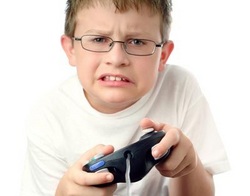Positives

Video games have some good effects on children's brains. In many video games, the skills required to win involve abstract and high level thinking. These skills are not even taught at school. Some of the mental skills trained by video games include; following instructions, problem solving and logic, hand-eye coordination, resource management, multitasking, quick thinking, strategy, and memory. The most widely used "positive" impact video games are said to have on children is that they may improve a player's manual dexterity (facility of using the hands) and computer literacy (the knowledge and ability to use computers and related technology efficiently). Video games have the ability to reduce stress as well as improve the players hand-eye coordination. The interactive quality of video games differs from passively viewing television or movies because it allows players to become active participants in the game's script. Video game training can make brains work more efficiently by thickening the areas of the cerebral cortex and parts of the brain become more skilled. As children play video games, the brain's function becomes more efficient in areas linked to critical thinking, reasoning, language and information processing. Although a negative aspect of video games is the repeated violence that comes up in them, this method of repetition has long been considered an effective teaching method in reinforcing learning patterns.
Negatives

Numerous studies show that video games, especially ones with violent content, make teens more aggressive. Video games may increase aggressive behavior because violent acts are continually repeated throughout the video game. The more children practice aggressive acts, the more likely they are to perform them in real life. Part of the increase in aggressive behavior is linked to the amount of time children are allowed to play video games. Studies show that majority of teens admit their parents do not impose a time limit on the number of hours they are allowed to play video games. Video games can also create family interaction problems such as less positive parental relations. The amount of time children and teens spend playing video games also reduces the amount of time they have for schoolwork, therefore showing a decrease in school performance. By the time a boy is 21, he has spent 10,000 hours playing video games alone. Spending all this time on video games prevents the child from learning social skills. When playing video games children live in a world that they create and if this activity continues, over time they have to be in a situation where they are controlling something-in school you control nothing, therefore there is a higher rate of boys dropping out.
